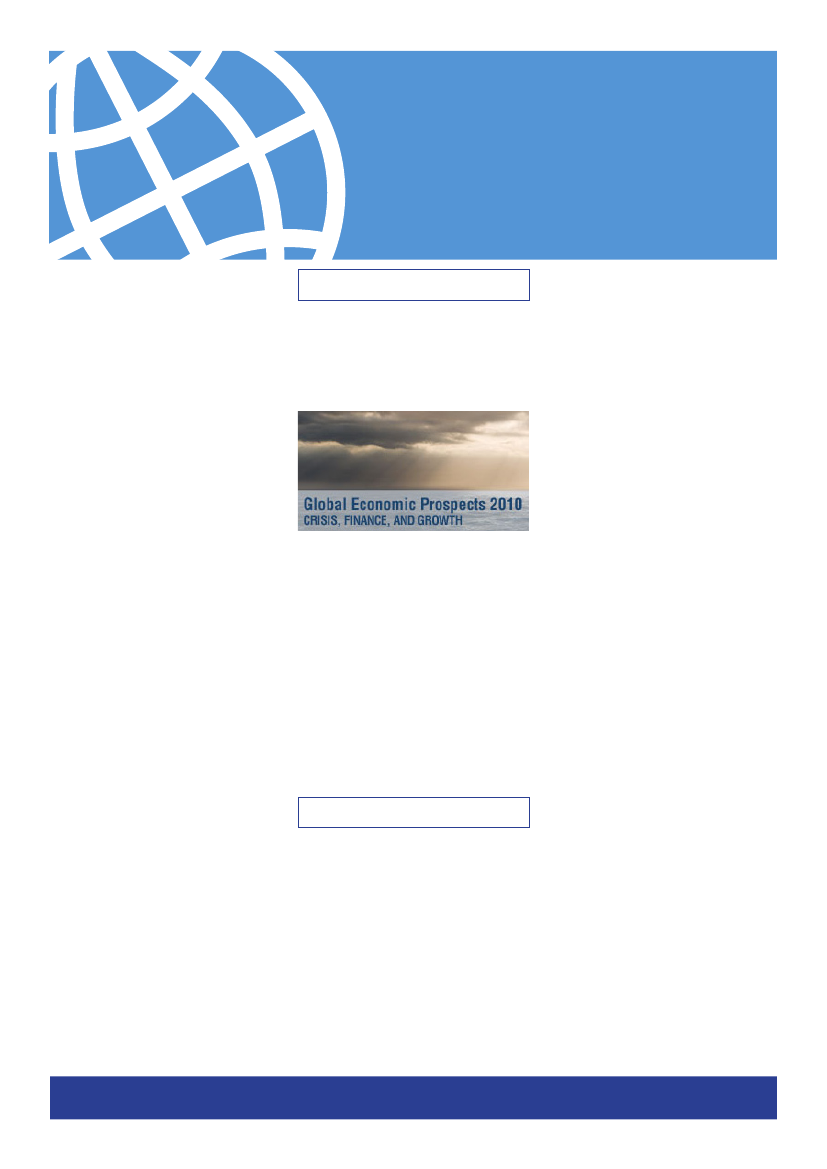Udenrigsudvalget 2009-10
URU Alm.del Bilag 138
Offentligt
World Bank UpdatePARLIAMENTARY NEWSLETTERFIELD SURVEY OFCOUNTRY OFFICES’ WORKAND PARLIAMENTARIANS
February 2010often mentioned as useful guidance.Parliamentary organizations.-MostCountry Offices believe that workingwith parliamentary organizations canbe helpful for their engagement withparliamentarians. Quite a few respon-dents see parliamentary organizationsas a way to share knowhow and ex-periences at a global or regional lev-el, while they focus on the nationalsituation themselves.Trends.-Thefrequency and types of interactionremain similar, but involvement inCASs (and PRSPs) seems to be on therise (CAS: inclusion of parliamentar-ians is 76% in 2009 vs 62% in 2004).While in 2004, 27% of Country Of-fices had developed a communica-tions plan or strategy for working withparliamentarians; in 2009, 74% has a(communications) strategy in place.Another change is that in 2004, 40%of Country Offices were never con-tacted by parliamentarians, while in2009, only 8% of respondents reportthat parliamentarians do not approachthem at all.
MObiageli Ezekwesili (World Bank) at theNational Assembly of Cameroon
New World Bank Group Environment Strategy
TABLE OF CONTENT- Feature Story- From the Regions- Upcoming activitiesfor Parliamentarians- Publications-NewsPage 1Page 1Page 3Page 4Page 4
ain findings of the survey re-gardsFrequency and typesof interactions.-Whenasked howfrequently their office interacts withparliamentarians or their staff, 42%of respondents indicated ‘severaltimes per year’, 20% ‘monthly’ and18% ‘weekly’. In recipient countries,these interactions most often take theform of consultations on the Bank-ledCountry Assistance Strategy (77% ofrespondents in recipient countries or-ganize such meetings). In donor coun-tries, meetings with a group of parlia-mentarians are most prevalent (71%).Overall, meetings with individualparliamentarians are most common(71% of respondents). Most often,Country Directors or Country Man-agers engage with parliamentarians(78%), closely followed by externalaffairs staff (74%).Positive and neg-ative outcome.-MostCountry Officesare positive about their interactionwith MPs: interaction led to betterinformed parliamentarians and a bet-ter relationship with and support fromMembers of Parliament.Guidanceand strategy.-86%of respondentswould appreciate guidance on howto engage with parliaments and MPs(8% doesn’t and 5% doesn’t know)and 80% declare that it would be help-ful if a ‘home’ was created within theBank with expertise and knowledgeon parliamentarians. Best practicesand sharing of experiences are mostFebruary 2010
FROM THE REGIONSPlease find below a selection of ac-tivities undertaken by country officesover the last month.
C
The World Bank Vice Presidentfor the Africa Region, Ms. ObiageliEzekwesili, met with Parliamentari-ans at the National Assembly of Cam-eroon where she had discussions withthe Finance and Budget Commission
ameroon- On December 15,
Issue n�8
1
World Bank Updateof the Parliament. This meeting pro-vided an opportunity to Ms. Ezekwe-sili to discuss the role of the NationalAssembly in ensuring effective publicfinance management in Cameroon,including vetting and monitoring thenational budget execution. Prior t themeeting with Parliamentarians, theBank presented and discussed its re-cently completed analysis of the “Fis-cal Policy for Growth and Develop-ment” of Cameroon, jointly chairedby the Minister of Finance and theRegional Vice President. Represen-tatives of the Government of Cam-eroon, civil society, academia anddevelopment partners took part inthis presentation as the report arguesthat the Government has the capac-ity to use fiscal policies as an effec-tive instrument to address the legacy,governance, and distribution issuesthat are constraining growth, whileproviding basic services and neces-sary public goods to the population.For more information, please contact[email protected].interest, possibly under the auspicesof the Nordic Council. The meetingwas opened by Chair of the ForeignAffairs Committee Marion Pedersenand Danish Development MinisterUlla Tørnæs. At the open meeting inthe Danish parliament, also attendedby CSOs, Swedish Executive Directoron the Board of the World Bank, AnnaBrandt, presented Nordic and Balticpriorities in the World Bank Group.Water, Energy and Transport DirectorJamal Saghir of the World Bank’s Sus-tainable Development Network gavean overview of the Bank’s efforts inproviding access to renewable energy.He also invited participants to com-ment on the new Energy Strategy forthe World Bank Group, currently un-der consultation. The Bank’s CountryManager to Poland, Estonia, Latviaand Lithuania, Thomas Blatt Laursenbriefed participants on the impact ofthe financial crisis in Eastern Europe,and the World Bank’s efforts to ad-dress the crisis. Sr. External AffairsCounselor Jakob Kopperud sharedinformation on the upcoming IDA16replenishment. For more information,see http://www.worldbank.org/ida.parliamentary benchmarks and stan-dards. This activity brought togetherthe Speakers, Clerks and or parliamen-tary representatives from parliamentsin South Asia, Malaysia and Singa-pore to critically examine the GlobalBenchmarks for Democratic Gover-nance. The aim of the Workshop wasto adapt the Global Benchmarks tothe specific needs and circumstancesof parliaments in the South Asia re-gion and Commonwealth SoutheastAsia; and ensure the input of Southand Southeast Parliament is capturedand presented to the upcoming GlobalConference on Parliamentary Bench-marks, scheduled to take place inMarch 2010
G
D
Foreign Affairs Committee inthe Danish Parliament invited fel-low MPs from the Nordic and BalticParliaments for a joint meeting on is-sues related to the World Bank. Theinitiative to the meeting - a first ofits kind - was taken by Danish mem-ber of the Board of the PNoWB, MPJeppe Kofod. It was agreed that MPsfrom the Nordic and Baltic countriesshould regularly share informationon World Bank issues, and meet an-nually to focus on issues of particular
enmark-On January 25 the
and Commonwealth SE AsiaParliamentary Benchmarks Workshoptook place in Dhaka from January 25-29, 2010 hosted by the Parliament ofBangladesh. This regional workshop,organized in partnership with theCommonwealth Parliamentary As-sociation and UNDP, forms part of alarger international process aimed atdeveloping greater consensus around
B
angladesh-The South Asia
President for Concessional Fi-nance and Global Partnerships (CFP)Axel van Trotsenburg met with theGerman Parliamentary DevelopmentCommittee (AWZ) on 16 December2009 in Berlin. Mr. van Trotsenburgwas the first member from the Bank’ssenior management team to engagewith the new German MPs and gov-ernment (including State Secretaryfor Economic Cooperation and De-velopment, Ms. Gudrun Kopp) sincethe September 2009 parliamentaryelection. On invitation of Ms. DagmarWoehrl, Chairperson of the Develop-ment Committee, Mr. van Trotsenburgpresented the World Bank’s work dur-ing the financial crisis, the role ofIDA, and outlined how the Bank isadapting and reforming as an institu-tion to tackle new challenges. Nearlyall of the 24 Committee members fromthe five main parties were present. Is-
ermany-World Bank Vice
PARLIAMENTARY NEWSLETTER
February 2010
Issue n�8
2
World Bank Updatesues raised by MPs in a Q&A sessionfollowing the presentation included abroad array of topics, such as changesto the IDA16 allocation system, theIFC’s support for fossil fuel projects,aid effectiveness and results, as well astransparency. The Development Com-mittee welcomed Mr. van Trotsen-burg’s proactive engagement withMPs, and requested that further meet-ings between the Bank’s managementand MPs take place also in the future.For more information, please contact[email protected](CAS). The Board should be review-ing the CASes from Kosovo (InterimStrategy Note) and Jamaica in Febru-ary; and from Cameroon and Pakistanin March. In all these countries, mem-bers of parliament were involved inCAS consultations. Tunisia plans tocarry out dissemination of its Coun-try Partnership Strategy (CPS) reportduring the months of February andMarch. As part of this, dependingon support from the government, thecountry office also plans to organize asecond session with Parliamentarians(the first session took place in Junewhen the Country Office consultedwith MPs on the strategic orientationsof the CPS as part of its preparation).awareness of aging population and itsimplications for the pension system aswell as the pension reform options
5 February: Residential SummerSchool for PACs, Beechworth,Australia
T
SELECTION OF UPCOMINGACTIVITIES FORPARLIAMENTARIANS
2 February: Annual West AfricaWorkshop for PACs
his regional EAP workshop or-ganized in partnership with LaTrobe University, the CommonwealthParliamentary Association and theCentre for Democratic Institutions,aims to bring together Chairs, DeputyChairs and Clerks of Public AccountsCommittees (PACs), and representa-tives from Supreme Audit Institutionsto highlight international good prac-tice, share experience and developAction Plans for reform.
For more information on these activi-ties, please contact mtixeront@world-bank.org. E-courses can be found onwww.parliamentarystrengthening.org.
O
Consultations on CountryAssistance Strategies (CAS)
rganized in partnership with theCommonwealth ParliamentaryAssociation (CPA) and the Parliamen-tary Centre in Africa this seminar willfocus in particular on the role of Pub-lic Account Committees (PACs) andSupreme Audit Institutions in WestAfrica in overseeing public procure-ment.
February: Effective Parliamen-tary Committees Course
T
CAST
CountryAssistanceStrategy
3 February: Workshop for Be-larus MPs on aging and pensionreform
his course, delivered in partner-ship with the Centre for Demo-cratic Institutions, aims to providepractical guidance to committeeclerks and staff on how to conductmore effective parliamentary com-mittee inquiries. It is designed forprofessional parliamentary staff in theEAP region and forms a componentof WBI’s broader efforts to strengthenthe capacity of parliamentary staff.
A
he World Bank regularly engagesparliamentarians and other con-stituencies during consultations onthe Country Assistance Strategies
s a part of a technical assistanceFebruary-Indonesian Public Ac-program on improving targetingcounts Committee Courseaccuracy of social assistance programsand ensuring pension system sustain-eld in partnership with the Cen-ability. Arranged together with DESAtre for Democratic Institutions,(United Nations Secretariat), the event the workshop aims to build the capac-is aimed to promote Parliamentarian ity of both chambers of the Indonesian
H
PARLIAMENTARY NEWSLETTER
February 2010
Issue n�8
3
World Bank UpdateParliament to engage more construc-tively in the budget process. A keycomponent of this program will be thetraining of local training institutionsthat will be able to provide ongoingcapacity support to the parliament asit seeks to enhance its role in the bud-get process.
PUBLICATIONSGlobal Economic Prospect 2010
T
he global economic recovery thatis now underway will slow laterthis year as the impact of fiscal stimu-
March-E*Learning: Parliamentand Governance of ExtractiveIndustry
T
he aim of this E*Learning courseis to build the capacity of Mem-bers of Parliament to provide con-structive political oversight over theentire extractive industry value chain.This training course is designed forMembers of Parliament and parlia-mentary staff in all regions.
2-4 March: Global IndicatorsConference in Paris
T
he World Bank Institute (WBI)and the UNDP are organizing anInternational Conference on Bench-marking and Self-assessment forDemocratic Legislatures in partner-ship with the Assemblée Parlemen-taire de la Francophonie (APF), theCommonwealth Parliamentary Asso-ciation (CPA), the Inter-Parliamen-tary Union (IPU), and the NationalDemocratic Institute for InternationalAffairs (NDI). This conference is partof a larger, long term process in whichseveral inter-parliamentary organiza-tions have developed standards andassessment frameworks for democrat-ic parliaments.
lus wanes. Financial markets remaintroubled and private sector demandlags amid high unemployment, ac-cording to the new report from theWorld Bank. Global Economic Pros-pects 2010 warns that while the worstof the financial crisis may be over, theglobal recovery is fragile. It predictsthat the fallout from the crisis willchange the landscape for finance andgrowth over the next 10 years. Moreinformation on www.worldbank.org/gep2010.
part of the global dialogue, membersof the Strategy team visited Bonn(Germany) on January 25-26, Osloand Copenhagen on January 27 and28. The Environment Strategy will ar-ticulate a set of principles and proposean approach for achieving the environ-mental sustainability of the WBG’sportfolio while the Energy strategywill guide the World Bank’s efforts toreduce poverty by helping developingcountries meet their energy needs in away that is environmentally, socially,and economically sustainable. Moreinformation on www.worldbank.org/environmentconsultations and www.worldbank.org/energyconsultations
World Bank fully supports debtrelief for Haiti
T
NEWSNew Environment and EnergyStrategies
T
he World Bank Group is prepar-ing new Environment and En-ergy Strategies to be submitted to theExecutive Board late 2010 and early2011 respectively. The EnvironmentStrategy has begun the consultationprocess (October 2009 until February15, 2010) while the Energy Strategywill begin its consultations early in2010 (February until June 2010). As
he World Bank fully supports debtrelief for Haiti. In June 2009, theWorld Bank, along with the IMF andother donors, granted Haiti $1.2 bil-lion in debt relief through the HeavilyIndebted Poor Countries initiative andthe Multilateral Debt Relief Initiative.Since 2005, the World Bank’s finan-cial support for Haiti ($363 million)has been carried out through grants.This does not include the $100 millionin grants announced on January 13,2010, in response to the earthquake.Currently, Haiti’s debt to the WorldBank, which is interest-free, is about$38 million –about 4% of Haiti’s totalexternal debt. Due to the crisis causedby the earthquake, the World Bank iswaiving any payments on this debt forthe next five years and at the same isworking to find a way forward to can-cel the remaining debt. More informa-tion on www.worldbank.org/haiti
For more information on parliamentarians and the World Bank, please visitwww.worldbank.org/parliamentariansFor comments about the newsletter, please contactMarie-Noëlle Tixerontat[email protected]
4




